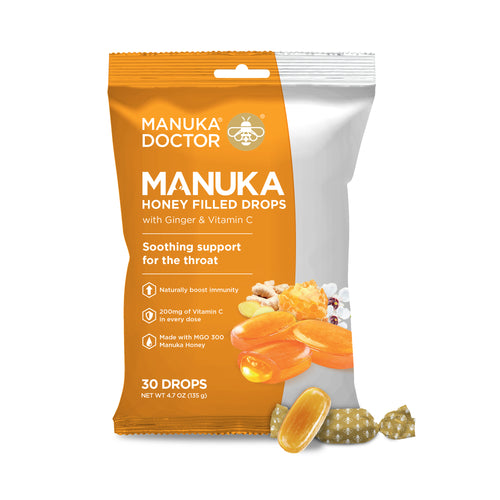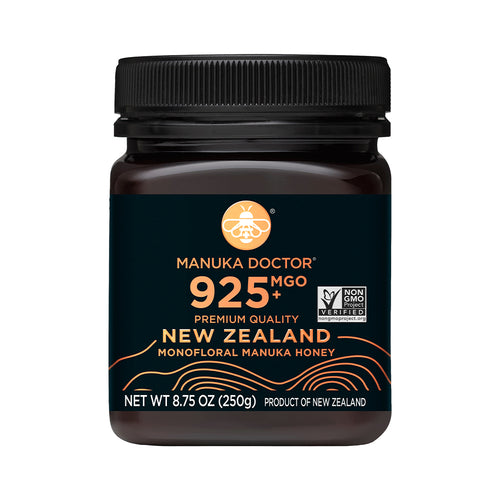Read Time: 6 minutes
Summary:
Manuka honey is prized not just for its rich taste but for a range of proven and emerging health benefits. From soothing coughs and supporting immunity to aiding digestion, hydrating skin, and promoting overall wellness, this natural product offers many ways to help you feel your best.
So you enjoy the delicious flavour of Manuka Honey. And you know it’s good for you. But what exactly are the benefits of Manuka Honey?
✅ Soothes coughs naturally
✅ Boosts Immunity & helps fight infections
✅ Supports gut health & digestion
✅ Helps soothe hay fever symptoms
✅ Hydrates & protects skin
✅ Overall wellness booster
Here’s a round-up of the evidence from the points listed above..
1. Soothes coughs naturally
Honey is one of the best cough-busters around – and a much better bet than over-the-counter cough mixtures, according to Dr Tessa Lewis, GP and chair of the NICE antimicrobial prescribing guideline group.1
It’s a great way to help clear a child’s cough so they can sleep at night, too - one paper found a spoonful of honey before bed was more effective than many medicines (although it should never be given to babies under the age of one because of the risk of botulism).2
Manuka Honey has been shown to have particularly potent anti-microbial, anti-inflammatory properties – so reach for a jar of this Manuka honey next time you have an annoying tickle in your throat.
We talked to Dr Hilary Jones about honey being recommended for coughs.
"Doctors and Healthcare Professionals have been urged to not over prescribe antibiotics for the more common Winter ailments, partly because evidence shows over-the-counter or natural products can be just as good to manage symptoms."
"When it comes to coughs, the current advice is to try honey or over-the-counter medicines first before antibiotics."
2. Boosts Immunity & helps fight infections
The study found Manuka Honey has antiviral effects, as well as being antimicrobial and anti-inflammatory.3 This means it could potentially help treat and prevent colds and flu. Next time you come down with a cold or flu, why not try a healing hot drink made from hot water with Manuka honey and lemon? Our piece on winter wellness will give you ideas for using higher MGO-rated Manuka honey for those winter bugs.

3. Supports gut health & digestion
Emerging research has linked Manuka Honey with better gut health. Firstly, it’s a prebiotic, which means it helps to promote the good gut bacteria that are so essential for keeping your digestive and immune systems ticking over efficiently.4 But Manuka has also been shown to have extra gut-balance supporting properties. It inhibits the growth of C.difficile, a bacteria that’s a major cause of food poisoning5. Anecdotal evidence suggests it could help with inflammatory bowel disease (IBD), too. More research is ongoing – watch this space!

4. Helps soothe hay fever symptoms
If spring and summer mean sneezing, running eyes and a streaming nose, reach for Manuka Honey. Some research has suggested honey can help regulate the immune system’s overreaction in hay fever, soothing symptoms.6 And with Manuka’s antimicrobial, anti-inflammatory powers, it could be your best bet. Plus you can take it to soothe any throat irritation you may experience.
Handy hint: If you put your honey in the fridge and let it get hard, a spoonful slowly melts, helping to line the throat and reduce the tickle.
5. Heals & protects skin
Topically, Manuka Honey has been shown to calm inflammation and irritation in eczema. And it’s known to help with other skin disorders, soothing inflammation and fighting infection.7,8
Honey on your face? Surely stickiness can’t be a skincare solution? Well, as it happens, if you have a few spots, or irritated or dry skin, a velvety feeling and sweet smelling cream containing Manuka Honey might be just the fix you need. The honey is named after the New Zealand Mānuka bush on whose flowers the bees feed, and it has some quite extraordinary properties. Of course honey has been used for health and beauty reasons for centuries. Many of the historical applications have now been proven in clinical studies, and there are plenty of youthful looking fans of Manuka Honey products, including such dewy skinned beauties seen in the press as Gwyneth Paltrow and Scarlett Johansson.
The secret is hydration – here’s why.
Thanks to the highly moisturising properties of Manuka honey, it helps hydrates and soothes dry skin , which in turn can help visually to reduce the appearance of fine lines and wrinkles.
Over time, skin loses collagen and thins, so gentle massage with a Manuka honey based cream or oil is a great option. It can help stimulate surface circulation of the skin to lift a dull complexion, whilst refreshing tired skin.
Honey is also osmotic9. This means that the massive quantities of sugar in it soak up surrounding moisture, meaning that bacteria die. Again, this means that Manuka Honey skincare may be ideal if you have spot prone skin. And by creating a moist healing environment, it helps skin to retain moisture and stay hydrated. This moisturising effect helps with elasticity and the texture of your complexion.
Rather than applying Manuka Honey directly to your skin (though some swear by it as a face mask), you’re better off using sweet-smelling products made by Manuka Doctor.
Dr Fred endorses the consumption of Manuka honey as one of his top 5 foods to help your complexion naturally.
As an anti-inflammatory, it can also help soothe red, irritated skin; as an anti-oxidant, Manuka helps ward off free radical damage such as wrinkles; and Manuka has moisturizing properties to help with dry skin.
Read More: Top 5 foods to help your complexion naturally - Manuka Doctor US
No matter what your skin concerns, you can rest assured that you’re putting ethically harvested and proven ingredients on your face. Bee happy!

6. Overall wellness booster
A 2018 review of studies10 described honey as a medicine – and R.A.W Manuka Honey is the superpowered version. Antibacterial, antimicrobial, anti-inflammatory and potentially antiviral, too, research over the next few years will probably reveal a raft of amazing new benefits. So enjoy it! Spread it on toast, add it to hot drinks, stir it into yoghurt, fruit and porridge. Or, of course, take it neat on a spoon – just like any other medicine.
Sources:
1 https://www.nice.org.uk/news/article/antibiotics-should-not-be-issued-as-first-line-of-treatment-for-a-cough-says-nice-and-phe
2 Cohen HA et al. Effect of Honey on Nocturnal Cough and Sleep Quality: A Double-blind, Randomized, Placebo-Controlled Study. PEDIATRICS Volume 130, Number 3, September 2012
3 Watanabe K et al. Anti-influenza viral effects of honey in vitro: potent high activity of manuka honey. Arch Med Res. 2014 Jul;45(5):359-65
4 Landry BKU et al. Honey, probiotics and prebiotics: review. Research Journal of Pharmaceutical, Biological and Chemical Sciences 7(5):2428 · September 2016
5 Mohan A et al. Effect of honey in improving the gut microbial balance. Food Quality and Safety, Volume 1, Issue 2, 1 May 2017
6 Asha’ari ZA et al. Ingestion of honey improves the symptoms of allergic rhinitis: evidence from a randomized placebo-controlled trial in the East Coast of Peninsular Malaysia. Ann Saudi Med. 2013 Sep-Oct; 33(5): 469–475
7 Alangari AA, Morris K, Lwaleed BA, et al. Honey is potentially effective in the treatment of atopic dermatitis: Clinical and mechanistic studies. Immunity, Inflammation and Disease. 2017; 5(2): 190-99
8 McLoone P et al. Honey: A Therapeutic Agent for Disorders of the Skin. Cent Asian J Glob Health. 2016; 5(1): 24
9 https://www.sciencelearn.org.nz/resources/1702-how-honey-heals-wounds
10 Khan SU, Anjum SI, Rahman K et al. Honey: Single food stuff comprises many drugs. Saudi J Biol Sci 2018 Feb; 25(2): 320–325






